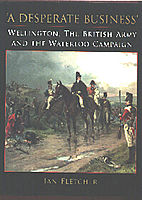Book
Review:
A Desperate Business
By
Ian Fletcher
Spellmount
 One
thing you can know for sure is that when you sit down to look
at one of Ian Fletcher's books you'll not only learn a lot, but
you'll have a damn good read at the same time.
One
thing you can know for sure is that when you sit down to look
at one of Ian Fletcher's books you'll not only learn a lot, but
you'll have a damn good read at the same time.
His
latest effort, A Desperate Business, is a marvelously informative192-page
effort that gives you an in-depth overall view of the 100 Days'
Campaign and mixes it up with excellent eyewitness accounts that
add real color.
There
are some very good photographs of the battlefields and surrounding
locations, as well as portraits, military art works and some exquisite
maps.
While
covering all the major incidents of the campaign in detail, Fletcher
also brings in new aspects and information that haven't been widely
known before.
He
may have fired the first returning salvo at European authors who
have slammed Wellington and the British view of the Waterloo Campaign,
and stated the redcoats' commander deliberately used the Prussians
as bait to keep Napoleon Bonaparte off his own troops.
A
Desperate Business puts forward the communications between
the two armies and includes the inaccurate dispositions given
to Wellington by his key aide William de Lancey and upon which
he based his messages to Field Marshal Blucher.
The
information looks to put paid to the allegations against the British
commander.
A
Desperate Business also gives a great account of how the Infamous
Army came together and was without many of the veteran regiments
that had served so well in the Peninsula.
Almost
an eighth of the book is taken up with the crucial battle at Quatre
Bras and it is the best account of this classic encounter-style
battle that I have read.
It
also points out that Wellington, in a desperate situation and
awaiting much-needed reinforcements, had been relying on De Lancey's
disposition reports to plan tactics at Quatre Bras but the redcoat
columns he was expecting to arrive were far from where they should
have been. This seems to back up the assertion that Wellington
had not deliberately deceived the Prussians - as he himself was
placed in extreme danger by the poor quality information.
Some
of the extracts used from a member of the 33rd Foot, Frederick
Pattison, are wonderful accounts and really throw you into the
middle of the action.
The
retreat from Quatre Bras to Waterloo has the delightful tale of
Captain Cavalie Mercer's trials in getting his guns away from
the pursuing French - the "Fox Hunt" as he put it.
Fletcher
has devoted almost 90 pages of his book to the actual battle of
Waterloo and fills it with astonishingly good material from eyewitnesses,
his own studies and some fantastic images.
Not
only are there scores of black-and-white photos and paintings,
but also 24 pages of colour images that show the British army's
uniforms, key incidents in the struggle, as well as some very
fine landscapes of the area.
Fletcher
has rounded out his examination with details of the little looked
at the aftermath of Waterloo - the advance on Paris.
Of
great note is the fact that Wellington had to rein in the vengeful
Prussians, who were eager to put Paris to a sacking, by persuading
Blucher such an event would be very costly for all sides. He even
had to stop the marshal trying to blow up the Pont de Jena, which
offended the Prussians by commemorating one of their humiliating
defeats at the hands of Napoleon Bonaparte.
On
a lighter side there is a description of how the victorious Austrian,
Prussian and Russian armies marched through the streets of Paris
with new uniforms and looking as if they were on a parade ground,
whereas Britain's unbeaten redcoats appeared in the uniforms they
had been in for the entire campaign.
A
Desperate Business is a must-have if you want to get some
truly excellent detail on Wellington's Waterloo campaign and his
courageous army. It should be in every enthusiast's home library.
- Richard Moore
9/10